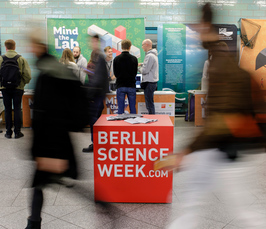Berlin Science Week 2020. Program by the Max Planck Society
Events in Berlin
- Start: Nov 4, 2020 06:00 PM (Local Time Germany)
- End: Nov 10, 2020 08:00 PM
- Location: Livestream via YouTube
- Host: Max Planck Society
- Contact: mpgberlin@gv.mpg.de

9.11.2020 │19.00 h
MaxPlanck Lecture
China – The New Science Superpower? National Developments and Global Effects
Dr. Anna L. Ahlers, Lise Meitner Research Group Leader at the Max Planck Institute for the History of Science, Berlin
China’s tremendous ascent within the global system of science over the last two decades is unprecedented and provoking. The country has become the world’s largest producer of scientific articles and a fast climber in global university rankings. The Chinese government is strongly promoting this rise, differentiates clearly between the natural and the social sciences, and aims at an authoritarian political control of science. It funds groundbreaking research domestically and internationally as well as attracting research talent from around the world. What are the implications of these developments, for the Chinese science system and with regard to structures and practices of international academic cooperation? This talk will map the most significant recent developments and introduce a new research group at the Max Planck Institute for the History of Science that sets out to explore these ambitious questions.
Anna L. Ahlers leads the new Lise Meitner Research Group “China in the Global System of Science” at the Max Planck Institute for the History of Science in Berlin. She is a member of the Junge Akademie (BBAW and Leopoldina) and a fellow of the Wissenschaftskolleg zu Berlin (2020/21). Trained in sinology and political science, her previous research has focused on rural governance and the nuances of “authoritarian environmentalism” in China. Her latest co-authored books include The Great Smog of China: A Short Event History of Air Pollution (2020) and Democratic and Authoritarian Political Systems in 21st Century World Society (2020).
10.11.2020 │19.00 h
MaxPlanck Lecture
Exploring the Universe with Gravitational Waves
Prof. Dr. Alessandra Buonanno, Director at Max Planck Institute für Gravitational Physics (Albert Einstein Institute), Potsdam
The detection of gravitational waves by LIGO in 2015 has constituted a major scientific discovery, as it has permitted a new kind of observation of the cosmos, quite different from electromagnetic and particle observations. In this lecture Alessandra Buonanno will discuss how those novel astronomical messengers are already unveiling distinctive and puzzling properties of the most extraordinary astrophysical objects in the universe: black holes and neutron stars. In the next decades, those sounds of silent will provide us with the unique and wondrous opportunity of listening (or peering back) to the very earliest moments of the universe, shedding light on its origin.
Alessandra Buonanno is the director of the "Astrophysical and Cosmological Relativity" Department at the Max Planck Institute for Gravitational Physics since 2014. She studied physics in Pisa, and held faculty positions in Paris and at the University of Maryland, where she became full professor in 2010. She is a leading theorist in the field of gravitational-wave physics. Her work on waveform modeling was essential in the detection of gravitational waves from binary systems, and the physical interpretation of the signals. For her contributions to LIGO and Virgo discoveries, she was awarded several prizes, including the 2018 Leibniz prize, the most prestigious research prize in Germany.
10.11.2020 │15.30 Uhr
Vorträge & Gespräch (in German)
Sharing is caring! Mit FAIRem Datenmanagement und KI die Materialien der Zukunft finden
Prof. Dr. Matthias Scheffler, Director at the Fritz Haber Institute of the Max Planck Society, Berlin
Prof. Dr. Claudia Draxl, Einstein Professor for Theoretical Solid State Physics at the Humboldt University of Berlin
Moderation: Prof. Peter A. Frensch, Vice President for Research, Humboldt-Universität zu Berlin
4.11.2020 │18.00 h
Max Planck-Humboldt Research Award │ Meet the Prizewinner
How can the same genes make workers and queens?
Prof. Roberte Bonasio, University of Pennsylvania, Philadelphia
This year’s Max Planck Humboldt Research Award winner Roberto Bonasio has decoded the genome of the ant species Harpegnathos saltator, found in India, so that it can be used as a model organism to study the effects of epigenetic changes. Adult Harpegnathos workers have the rare ability among ants to transition into so-called pseudo-queens. They behave like real queens, lay eggs and become just as old. Roberto Bonasio and his team can artificially trigger this transformation in the laboratory and thus analyze the changes in the animals’ genetic make-up. As part of the research cooperation with the University of Freiburg, Roberto Bonasio and neuroscientists at the University of Freiburg will now investigate the restructuring of the brain of individuals who switch between worker and queen status.
Roberte Bonasio is Associate Professor of Cell and Developmental Biology at the University of Pennsylvania, Philadelphia. He initially studied biotechnology at the University at Milan. Following stations at New York University and Harvard, he joined the University of Pennsylvania, where he has been heading his own laboratory since 2014. Bonasio is honoured with the Max Planck-Humboldt Research Award 2020 for his outstanding research in the field of epigenetics. His studies on ants show how the epigenetic regulation of genes can influence the behaviour and appearance of individuals. Bonasio will use the 1.5 million euros in funding – provided by the Federal Ministry for Education and Research – for a deeper scientific collaboration with the University of Freiburg, Germany.
All talks will be live streamed to the Max Planck YouTube channel. Please note that the links will not be open until one hour before the event starts.